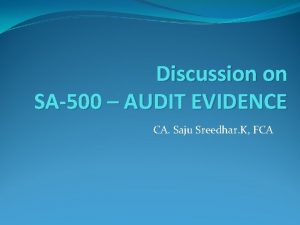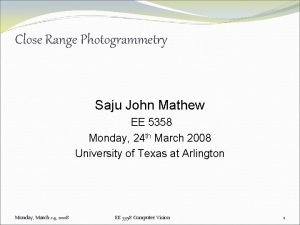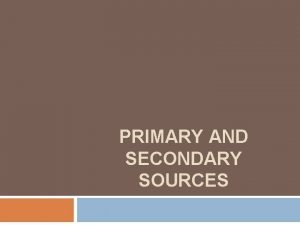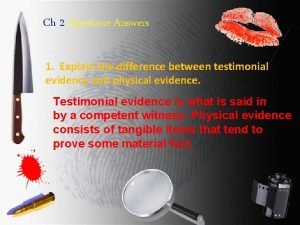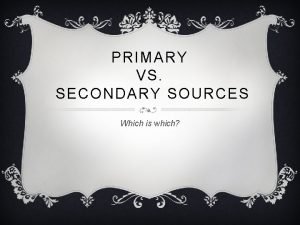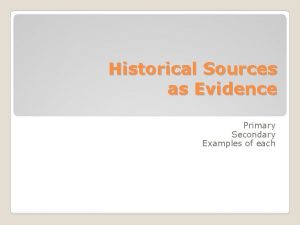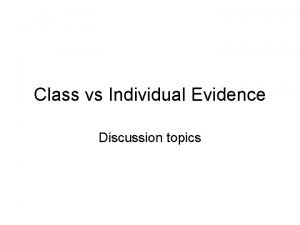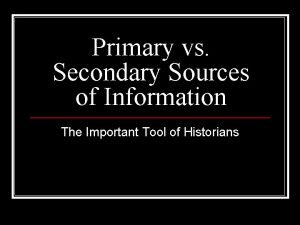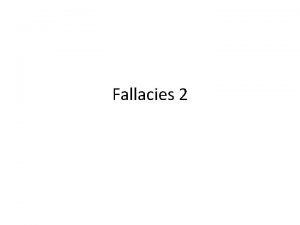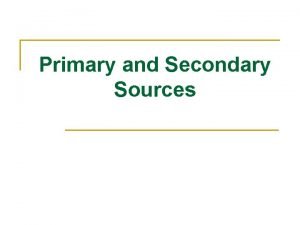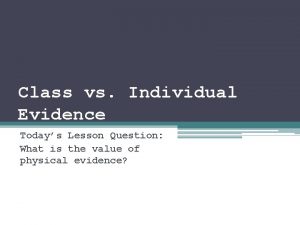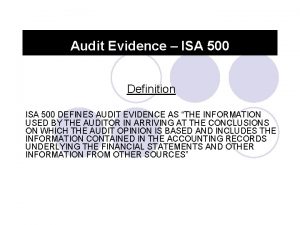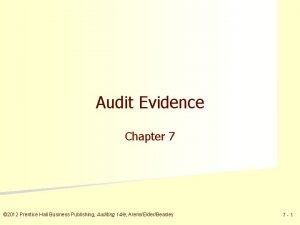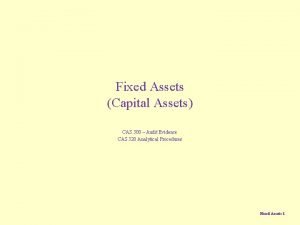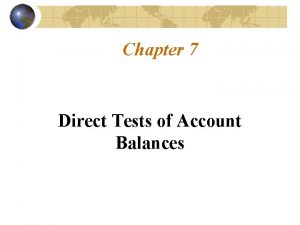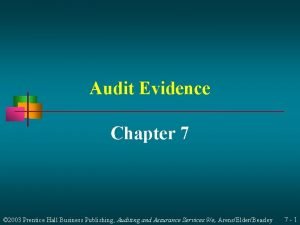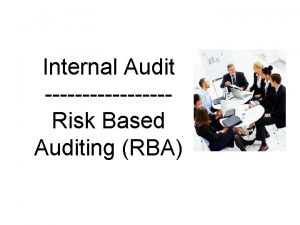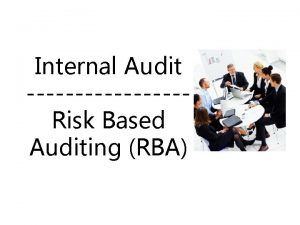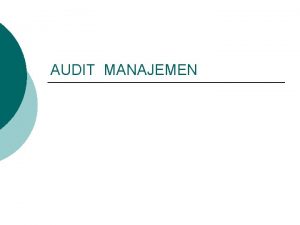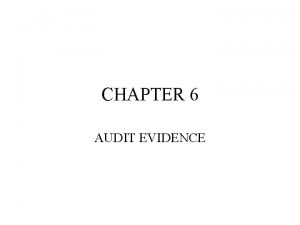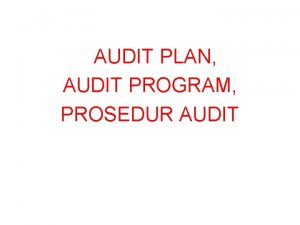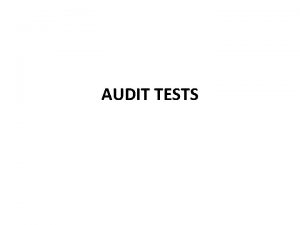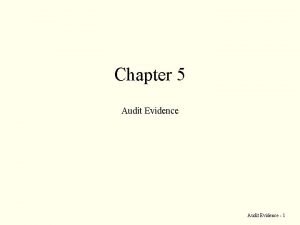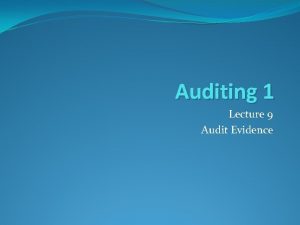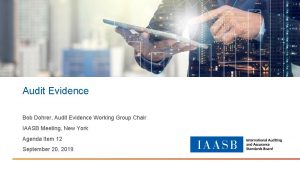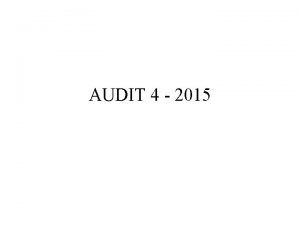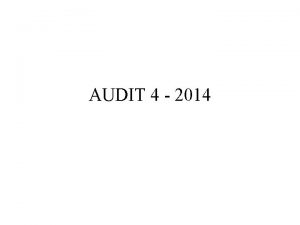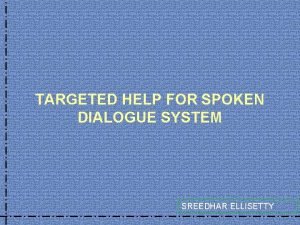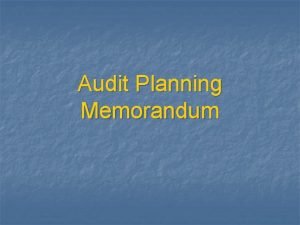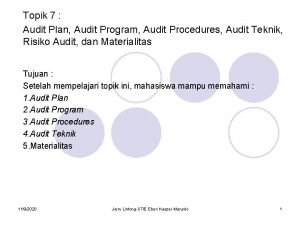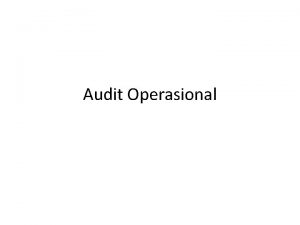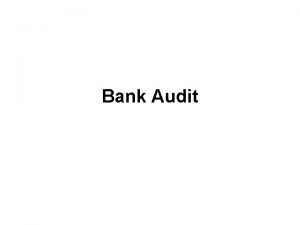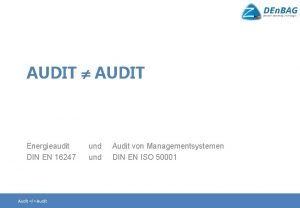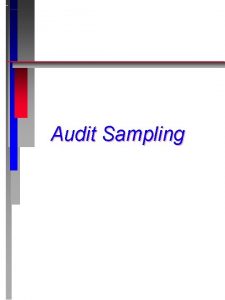Discussion on SA500 AUDIT EVIDENCE CA Saju Sreedhar






















- Slides: 22

Discussion on SA-500 – AUDIT EVIDENCE CA. Saju Sreedhar. K, FCA

Preface Ø Audit evidence forms the bedrock of the auditor’s report on financial statements. Auditor expresses his opinion of the financial statements based on evaluation of sufficient appropriate audit evidence that supports / corroborates the various assertions by the auditee in respect of financial statements. Having regard to the importance of evidence ICAI has issued SA 500 which contains fundamental concepts relating to audit evidence.

Ø “SA 700 - Forming an Opinion and Reporting on Financial Statements” lays emphasis on importance of Audit evidence. Ø Auditors’ Responsibility Our responsibility is to express an opinion on these financial statements based on our audit. We conducted our audit in accordance with the Standards on Auditing issued by the Institute of Chartered Accountants of India. Those Standards require that we comply with ethical requirements and plan and perform the audit to obtain reasonable assurance about whether the financial statements are free from material misstatements. An audit involves performing procedures to obtain audit evidence about the amounts and the disclosures in the financial statements. . . . We believe that the audit evidence we have obtained is sufficient and appropriate to provide a basis for our

Ø Opinion In our opinion and to the best of our information and according to the explanations given to us, the aforesaid financial statements give the information required by the Act in the manner so required and give a true and fair view in conformity with the accounting principles generally accepted in India ………… Ø Report on Other Legal and Regulatory Requirements 2. As required by Section 227(3) of the Act, we report that: (a) We have obtained all the information and explanations which to the best of our knowledge and belief were necessary for the purposes of our audit. (b) In our opinion, proper books of account as required by law have been kept by the Company so far as it appears from our examination of those books.

Scope Ø Explains what constitutes audit evidence in an audit of financial statements Ø Deals with auditor’s responsibility to design and perform audit procedures to obtain sufficient and appropriate audit evidence to draw conclusion on the financial statements Ø SA is applicable to all audit evidence obtained during the course of the audit

Effective Date Ø This SA is effective for audits of financial statements for periods beginning on or after April 1, 2009.

Objective Ø Design and perform audit procedures to obtain sufficient appropriate audit evidence to draw a reasonable conclusion on which to base the auditor’s opinion

Requirements of the standard Ø Sufficient appropriate audit evidence (para. 6) Ø auditor shall perform audit procedures to obtain sufficient appropriate audit evidence to support auditor’s opinion and audit report Ø Audit evidence is cumulative in nature and is primarily obtained from the audit procedures performed in course of audit ( Compliance and substantive) Ø other sources of audit evidence include firm’s quality control procedures for client acceptance and continuance.

Ø Sufficient Appropriate audit evidence is required to give reasonable assurance to the auditor that the FS taken as a whole are free from material misstatements and thereby reduces the audit risk to an acceptable low levels. Ø Sufficiency Ø Ø Ø measure of quantity of audit evidence effected by auditor’s risk assessment procedures quality of audit evidence Ø Appropriateness Ø is a measure of the quality of audit evidence Ø emphasis on the relevance and reliability of audit evidence Ø is influenced by the source of audit evidence.

Sources of audit evidence Ø Can be broadly classified as internal and external sources Ø The level of assurance as to the audit evidence would depend upon the source and nature of audit evidence.

Procedures for obtaining audit evidence Ø Auditor obtains audit evidence through performing Ø risk assessment procedures Ø compliance procedures Ø Substantive procedures Ø The audit procedures for obtaining audit evidence comprises of the following Ø Inspection Ø examination of records both internal and external, in paper, electronic or other media and also includes a physical examination of an asset. Ø The reliability of audit evidence is dependent upon the nature, source and effectiveness of controls over their production. Ø Observation Ø provides audit evidence wrt performance of a process/ procedure but is limited to the point in time at which the observation takes place, and by the fact that the act of being observed may affect how the process or procedure is performed.

Ø External confirmation Ø evidence obtained by the auditor as a direct written response to the auditor by a third party Ø is relevant for assertions relating to account balances and their elements Ø they are not confined to account balances alone and may extent to other agreements and transactions Ø Recalculation Ø Reperformance Ø Analytical procedures

Ø Inquiry Ø Seeking information from knowledgeable persons, both financial and non financial within or outside the entity Ø evaluating responses to inquiry is an integral part of inquiry process Ø Inquiry may provide the auditor with information not previously known or may provide corroborative evidence. Ø It may also provide information which contradicts the other information in pocession of the auditor, in which case the auditor has to modify or perform additional audit procedures.

Information to be used as audit evidence Ø Relevance and Reliability (Para 7) In design and performance of audit procedures, the relevance and reliability of the information to be used as audit evidence shall be considered by the auditor Ø Relevance deals with the logical connection with or bearing upon the purpose of audit procedure, the assertions under consideration. Ø A given set of audit procedures provides audit evidence that are relevant to certain assertions but not to others. ( inspection of FA gives audit evidence regarding the existence but do not provide evidence as to the valuation and ownership) Ø Compliance procedures are designed to obtain audit evidence with respect to the existence and operational effectiveness of internal controls for preventing or detecting and correcting material misstatements at assertion level.

Ø substantive procedure are designed to detect material misstatement at the assertion level. Reliability Ø reliability of audit evidence is influenced by the source and nature, circumstances under which it is obtained including the controls over its preparation and maintenance. Ø The following generalizations regarding reliability of audit evidence are to be considered Ø Ø Reliability is increased if it is obtained from an independent source Reliability of internally generated audit evidence increases if the internal controls over their generation are effective Audit evidence obtained directly are more reliable in comparison to one obtained indirectly or by inference. Audit evidence provided by original documents are more reliable as compared to photocopies and documents digitized or converted to electronic form.

Relying on the work of management’s expert (Para 8) ØWhile relying on the work of management’s expert the auditor shall: Ø Evaluate the competence, capability and objectivity of the expert Ø Obtain an understanding of the work of the expert Ø Evaluate the appropriateness of the expert’s work as audit evidence for relevant assertions

Ø When using the information produced by the entity, the auditor shall evaluate whether the information is sufficiently reliable for auditor’s purposes including (Para 9) Ø Obtaining audit evidence regarding accuracy and completeness of audit evidence Ø Evaluating whether the information is sufficiently precise and detailed for auditor’s purposes

Selecting Items for Testing to obtain audit evidence (Para 10) Ø An effective testing is designed to provide appropriate audit evidence sufficient for auditors purposes Ø In selecting the items for testing the auditor need to consider relevance, sufficiency and reliability of items selected Ø Means available to the auditor for selection of items for testing are Ø Selecting all items (100% verification) Ø Selecting specific items Ø Audit sampling Ø Auditor should select any one or combination of these means as may be appropriate in the circumstances.

100% verification Ø Auditor may decide to verify the entire population in the following circumstances Ø Population consists of small number of high value items Ø There is significant risk an other means do not provide the sufficient appropriate audit evidence Ø Repetitive nature of the calculation or other processes performed by the information system make 100% examination cost effective

Selecting Specific items Ø The factors to be considered for by the auditor for this purpose include Ø understanding the entity, assessed risk of material misstatement and characteristics of population being selected Ø specific items selected include Ø Ø Ø High Value or Key items All items over a certain amount items to obtain information about matters such as the nature of the entity or nature of the transactions Ø Selective examination of specific items do not constitute audit sampling and as such do not provide evidence as to remainder of the population

Inconsistency in / doubts over reliability of audit evidence (Para 11) Ø If audit evidence obtained from one source is inconsistent with that obtained from another; or Ø The auditor has doubts over the reliability of information to be used as audit evidence, Ø The auditor shall determine what modifications or additions to audit procedures are necessary to resolve the matter, and shall consider the effect of the matter, if any, on other aspects of the audit.

THANK YOU
 Sa500 audit
Sa500 audit Where is jessica going class 5
Where is jessica going class 5 Ee5358
Ee5358 Simple distillation observations
Simple distillation observations Primary evidence vs secondary evidence
Primary evidence vs secondary evidence How can class evidence narrow a field of suspects
How can class evidence narrow a field of suspects Secondary sources
Secondary sources Primary evidence vs secondary evidence
Primary evidence vs secondary evidence A pair of latex gloves was found at a crime scene
A pair of latex gloves was found at a crime scene Primary evidence vs secondary evidence
Primary evidence vs secondary evidence Is fiber class evidence
Is fiber class evidence Ecological fallacy meaning
Ecological fallacy meaning Primary evidence vs secondary evidence
Primary evidence vs secondary evidence Class vs individual evidence
Class vs individual evidence Isa 500 summary
Isa 500 summary Audit evidence
Audit evidence Audit evidence for fixed assets
Audit evidence for fixed assets Chapter 7 audit evidence
Chapter 7 audit evidence Chapter 7 audit evidence
Chapter 7 audit evidence Perbedaan audit konvensional dengan audit berbasis risiko
Perbedaan audit konvensional dengan audit berbasis risiko Perbedaan audit konvensional dengan audit berbasis risiko
Perbedaan audit konvensional dengan audit berbasis risiko Hubungan ekonomisasi efisiensi dan efektivitas
Hubungan ekonomisasi efisiensi dan efektivitas Limitations of auditing
Limitations of auditing
